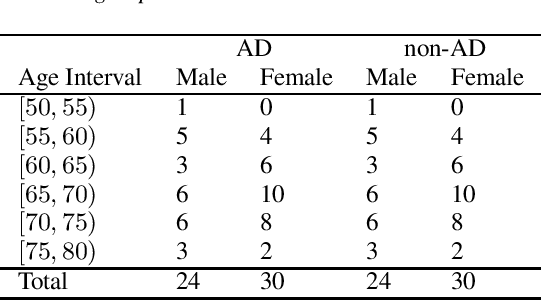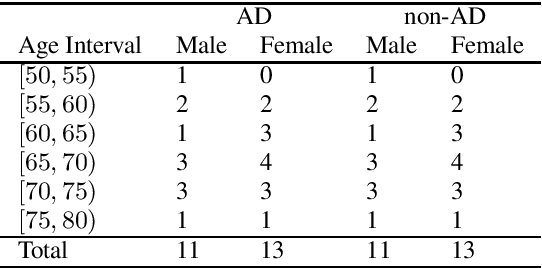Sofia de la Fuente
Detecting cognitive decline using speech only: The ADReSSo Challenge
Mar 23, 2021Abstract:Building on the success of the ADReSS Challenge at Interspeech 2020, which attracted the participation of 34 teams from across the world, the ADReSSo Challenge targets three difficult automatic prediction problems of societal and medical relevance, namely: detection of Alzheimer's Dementia, inference of cognitive testing scores, and prediction of cognitive decline. This paper presents these prediction tasks in detail, describes the datasets used, and reports the results of the baseline classification and regression models we developed for each task. A combination of acoustic and linguistic features extracted directly from audio recordings, without human intervention, yielded a baseline accuracy of 78.87% for the AD classification task, an MMSE prediction root mean squared (RMSE) error of 5.28, and 68.75% accuracy for the cognitive decline prediction task.
Alzheimer's Dementia Recognition through Spontaneous Speech: The ADReSS Challenge
Apr 30, 2020



Abstract:The ADReSS Challenge at INTERSPEECH 2020 defines a shared task through which different approaches to the automated recognition of Alzheimer's dementia based on spontaneous speech can be compared. ADReSS provides researchers with a benchmark speech dataset which has been acoustically pre-processed and balanced in terms of age and gender, defining two cognitive assessment tasks, namely: the Alzheimer's speech classification task and the neuropsychological score regression task. In the Alzheimer's speech classification task, ADReSS challenge participants create models for classifying speech as dementia or healthy control speech. In the the neuropsychological score regression task, participants create models to predict mini-mental state examination scores. This paper describes the ADReSS Challenge in detail and presents a baseline for both tasks, including a feature extraction procedure and results for a classification and a regression model. ADReSS aims to provide the speech and language Alzheimer's research community with a platform for comprehensive methodological comparisons. This will contribute to addressing the lack of standardisation that currently affects the field and shed light on avenues for future research and clinical applicability.
A Method for Analysis of Patient Speech in Dialogue for Dementia Detection
Nov 25, 2018



Abstract:We present an approach to automatic detection of Alzheimer's type dementia based on characteristics of spontaneous spoken language dialogue consisting of interviews recorded in natural settings. The proposed method employs additive logistic regression (a machine learning boosting method) on content-free features extracted from dialogical interaction to build a predictive model. The model training data consisted of 21 dialogues between patients with Alzheimer's and interviewers, and 17 dialogues between patients with other health conditions and interviewers. Features analysed included speech rate, turn-taking patterns and other speech parameters. Despite relying solely on content-free features, our method obtains overall accuracy of 86.5\%, a result comparable to those of state-of-the-art methods that employ more complex lexical, syntactic and semantic features. While further investigation is needed, the fact that we were able to obtain promising results using only features that can be easily extracted from spontaneous dialogues suggests the possibility of designing non-invasive and low-cost mental health monitoring tools for use at scale.
 Add to Chrome
Add to Chrome Add to Firefox
Add to Firefox Add to Edge
Add to Edge